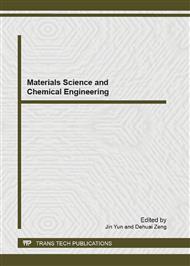p.808
p.813
p.817
p.822
p.829
p.835
p.841
p.846
p.851
Production of Lightweight Ceramsite from the Yellow River Silt and its Performance Investigation in a Biological Aerated Filer (BAF) Reactor
Abstract:
This study discussed the possibility of employing the Yellow River Silt (YRS) as the starting materials to produce lightweight ceramisite (LWC) by a non-sintering process. Cement and sodium silicate were used as additives. The performance of the LWC serving as a biomedium in a biological aerated reactor (BAF) for hospital wastewater treatment was investigated and the optimum operation condition was studied. Results presented that: (1) YRS could be used to prepare the LWC under the propitious condition (the ratio of YRS to cement was 75:25, the percentage of sodium silicate was 7% and the curing time was 5 d); (2) LWC could be used as a packing medium in the BAF. The BAF has large removal efficiencies on COD¬cr and NH3-N when the hydraulic retention time (HRT), the ratio of air to liquid (A/L) and the height of packing medium were 6 h, 5:1 and 80 cm respectively.
Info:
Periodical:
Pages:
829-834
DOI:
Citation:
Online since:
May 2013
Authors:
Price:
Сopyright:
© 2013 Trans Tech Publications Ltd. All Rights Reserved
Share:
Citation:


